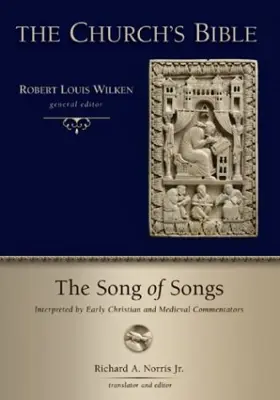

The Song of Songs: Interpreted by Early Christian and Medieval Commentators
Pages
344
Publisher
Eerdmans
Published
1/1/2003
ISBN-13
9780802825797
Collections
This book appears in the following featured collections.
- Pre-Modern Commentaries by Matt Quintana
Reviews
Two short articles by the general editor of the series, R. L. Wilken, open the book: �Series Preface� (vii�viii) and �Interpreting the Old Testament� (x�xvi). Norris then gives us an �Introduction to the Song of Songs� (xvii�xxi). The bulk of the book (1�297) is arranged as fo llows. The Song of Songs is divided into twenty-four subsections, from the superscription/title of 1:1 to the last section, 8:11�14. For each verse or group of verses the relevant Septuagint and Vulgate texts are translated into English and set opposite each other. The reason given for this choice of base text, rather than the Hebrew text, is the fact that the church fathers worked from the Greek and later the Latin texts (xvi). A terse, italicized, helpful comment by Norris then precedes his own translated choice of early Christian interpreters up to the Middle Ages. These excerpts from commentaries and sermons are arranged as verse-by-verse comments under their producers� names. Who are the authors whose works are used, and what are the sources for these works? These are set out in appendix A (298�302) and B (303�9), respectively. The author list is alphabetical (see below). The source list is conveniently arranged according to the order of appearance of their authors in each section. Three helpful indexes dealing with subjects (311�15), names (316�17), a nd scripture (318�25) are provided.
[Full Review]
Individuals who read Richard Norris’s volume on the Song of Songs and who have not studied the writings of the early church fathers or the medieval commentators will find this volume both fascinating and helpful. Norris’s style of writing provides easy-to-follow comments and introduces the novice to the interpretive methods of the early church. The book is a good source for further study. Those who are acquainted with these early writings will discover a practical resource in Norris’s work. Both the series (The Church’s Bible) and the current volume (The Song of Songs) are well defined. Robert Louis Wilken (series editor) and Norris present strong arguments for the modern scholar’s examination of the commentary on scripture by the early fathers. The arguments by the early fathers for the use of allegory as an interpretative tool (presented several times in the volume) assist the modern scholar in the understanding that these early commentators took seriously the task of interpreting the texts of the Old Testament and viewed their endeavors as following the steps of the writers of the New Testament. They truly saw “the Old Testament as a book about Christ” (xii). This volume divides the Song into twenty-four sections that correspond to the general outlines of other modern commentaries.
[Full Review]
